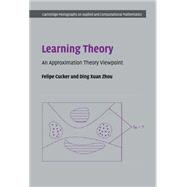
Note: Supplemental materials are not guaranteed with Rental or Used book purchases.
Purchase Benefits
Looking to rent a book? Rent Learning Theory: An Approximation Theory Viewpoint [ISBN: 9780521865593] for the semester, quarter, and short term or search our site for other textbooks by Felipe Cucker , Ding Xuan Zhou. Renting a textbook can save you up to 90% from the cost of buying.
| Foreword | p. ix |
| Preface | p. x |
| The framework of learning | p. 1 |
| Introduction | p. 1 |
| A formal setting | p. 5 |
| Hypothesis spaces and target functions | p. 9 |
| Sample, approximation, and generalization errors | p. 11 |
| The bias-variance problem | p. 13 |
| The remainder of this book | p. 14 |
| References and additional remarks | p. 15 |
| Basic hypothesis spaces | p. 17 |
| First examples of hypothesis space | p. 17 |
| Reminders I | p. 18 |
| Hypothesis spaces associated with Sobolev spaces | p. 21 |
| Reproducing Kernel Hilbert Spaces | p. 22 |
| Some Mercer kernels | p. 24 |
| Hypothesis spaces associated with an RKHS | p. 31 |
| Reminders II | p. 33 |
| On the computation of empirical target functions | p. 34 |
| References and additional remarks | p. 35 |
| Estimating the sample error | p. 37 |
| Exponential inequalities in probability | p. 37 |
| Uniform estimates on the defect | p. 43 |
| Estimating the sample error | p. 44 |
| Convex hypothesis spaces | p. 46 |
| References and additional remarks | p. 49 |
| Polynomial decay of the approximation error | p. 54 |
| Reminders III | p. 55 |
| Operators defined by a kernel | p. 56 |
| Mercer's theorem | p. 59 |
| RKHSs revisited | p. 61 |
| Characterizing the approximation error in RKHSs | p. 63 |
| An example | p. 68 |
| References and additional remarks | p. 69 |
| Estimating covering numbers | p. 72 |
| Reminders IV | p. 73 |
| Covering numbers for Sobolev smooth kernels | p. 76 |
| Covering numbers for analytic kernels | p. 83 |
| Lower bounds for covering numbers | p. 101 |
| On the smoothness of box spline kernels | p. 106 |
| References and additional remarks | p. 108 |
| Logarithmic decay of the approximation error | p. 109 |
| Polynomial decay of the approximation error C[infinity]for kernels | p. 110 |
| Measuring the regularity of the kernel | p. 112 |
| Estimating the approximation error in RKHSs | p. 117 |
| Proof of Theorem 6.1 | p. 125 |
| References and additional remarks | p. 125 |
| On the bias-variance problem | p. 127 |
| A useful lemma | p. 128 |
| Proof of Theorem 7.1 | p. 129 |
| A concrete example of bias-variance | p. 132 |
| References and additional remarks | p. 133 |
| Least squares regularization | p. 134 |
| Bounds for the regularized error | p. 135 |
| On the existence of target functions | p. 139 |
| A first estimate for the excess generalization error | p. 140 |
| Proof of Theorem 8.1 | p. 148 |
| Reminders V | p. 151 |
| Compactness and regularization | p. 151 |
| References and additional remarks | p. 155 |
| Support vector machines for classification | p. 157 |
| Binary classifiers | p. 159 |
| Regularized classifiers | p. 161 |
| Optimal hyperplanes: the separable case | p. 166 |
| Support vector machines | p. 169 |
| Optimal hyperplanes: the nonseparable case | p. 171 |
| Error analysis for separable measures | p. 173 |
| Weakly separable measures | p. 182 |
| References and additional remarks | p. 185 |
| General regularized classifiers | p. 187 |
| Bounding the misclassification error in terms of the generalization error | p. 189 |
| Projection and error decomposition | p. 194 |
| Bounds for the regularized error D([gamma],[pi]of f[subscript gamma] | p. 196 |
| Bounds for the sample error term involving f[subscript gamma] | p. 198 |
| Bounds for the sample error term involving f[superscript pi][subscript z,gamma] | p. 201 |
| Stronger error bounds | p. 204 |
| Improving learning rates by imposing noise conditions | p. 210 |
| References and additional remarks | p. 211 |
| References | p. 214 |
| Index | p. 111 |
| Table of Contents provided by Ingram. All Rights Reserved. |
The New copy of this book will include any supplemental materials advertised. Please check the title of the book to determine if it should include any access cards, study guides, lab manuals, CDs, etc.
The Used, Rental and eBook copies of this book are not guaranteed to include any supplemental materials. Typically, only the book itself is included. This is true even if the title states it includes any access cards, study guides, lab manuals, CDs, etc.